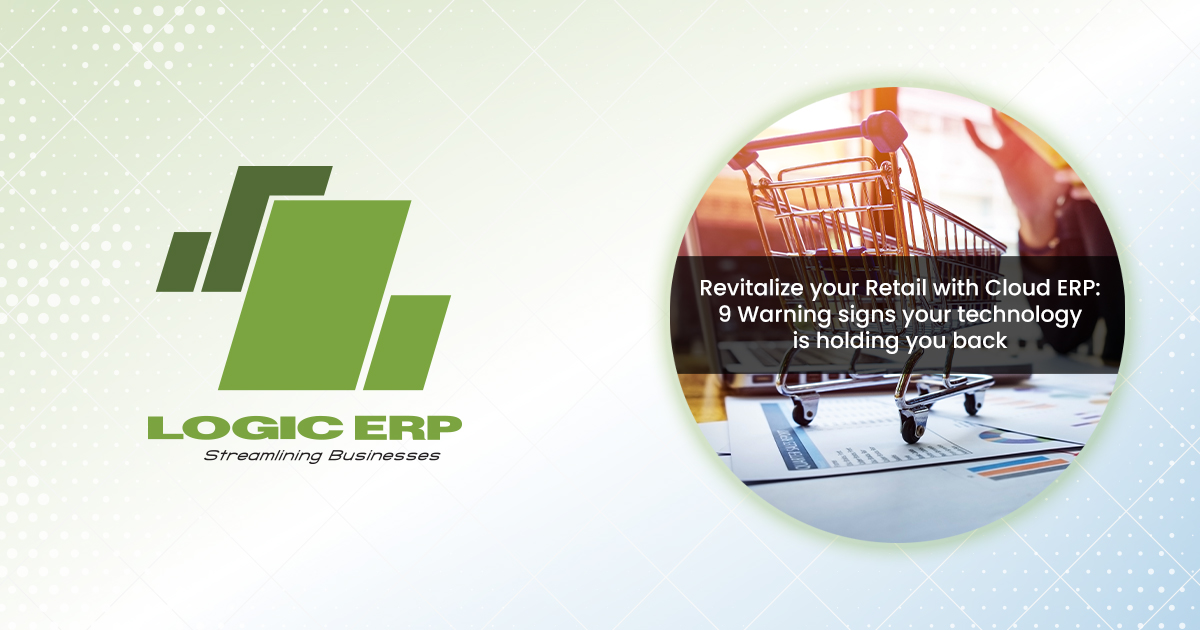

In the fast-paced world of retail, staying ahead of the curve is not just a competitive advantage—it’s a survival necessity. The rise of e-commerce, changing consumer preferences, and a relentless demand for seamless customer experiences have forced retailers to evolve rapidly. However, some businesses still cling to outdated technology, unaware that it may be jeopardizing their future success. In this blog post, we’ll explore the red flags that indicate whether outdated technology is undermining your retail business and how adopting modern solutions like cloud ERP and retail software can turn the tide.
1. Inefficient Inventory Management:
Outdated technology often leads to inaccurate and inefficient inventory management. If you find yourself grappling with overstocked shelves or, conversely, facing stockouts and disappointed customers, it’s time to reassess your systems. Cloud ERP software, designed for retail, can provide real-time visibility into your inventory, ensuring better control and preventing costly mistakes.
2. Lack of Data Integration:
In the era of big data, information is power. If your various systems—point-of-sale, customer relationship management, and inventory management—are not integrated, you’re losing valuable insights. ERP software, especially those in the cloud, offer seamless data integration, enabling you to make informed decisions based on a holistic view of your business.
3. Poor Customer Experience:
Outdated technology often translates to a subpar customer experience. Slow checkout processes, inability to provide real-time product information, or a disjointed online and in-store experience can drive customers away. Retail software streamlines operations, creating a unified customer experience across channels and ensuring that your business stays competitive in the age of omnichannel retail.
4. Inflexible Payment Options:
The way customers pay for goods has evolved significantly. If your retail business struggles with outdated payment systems that don’t support contactless payments, mobile wallets, or other modern options, you risk losing customers who prefer convenient and secure payment methods. Upgrading to modern retail ERP software ensures that your business can adapt to evolving payment trends.
5. Difficulty in Scaling:
As your retail business grows, so do its demands. If your current technology infrastructure hinders rather than facilitates scalability, it’s a clear sign of obsolescence. ERP software is designed to scale with your business, providing the flexibility and agility needed to adapt to changing market dynamics and expanding operations seamlessly.
6. Ineffective Employee Collaboration:
Outdated technology often results in siloed information and poor communication among employees. ERP software fosters collaboration by centralizing data and processes, allowing employees to work more efficiently across departments. Enhanced communication and collaboration contribute to improved productivity and a better overall customer experience.
7. Security Concerns:
With the increasing frequency and sophistication of cyber threats, the security of customer data is paramount. Outdated systems are more susceptible to security breaches. Cloud ERP software, with its robust security features and regular updates, provides a more secure environment for your business data, safeguarding both your reputation and customer trust.
8. High IT Maintenance Costs:
If you find yourself allocating a significant portion of your budget to maintaining outdated systems and addressing recurring issues, it’s a clear indication that your technology is holding you back. ERP software reduces IT maintenance costs, as updates and maintenance are handled by the service provider, allowing your business to allocate resources more strategically.
9. Inability to Keep Up with Market Trends:
The retail landscape is dynamic, with trends evolving rapidly. If your business struggles to adapt to new market trends, such as personalized shopping experiences, real-time analytics, or AI-driven recommendations, it’s time to consider upgrading your technology stack. Cloud retail software provides the agility needed to embrace and implement the latest industry trends.
In conclusion, the survival and success of a retail business hinge on its ability to adapt to the ever-changing landscape. Recognizing the red flags of outdated technology and embracing erp solutions is not just a strategic move—it’s a necessity for staying competitive and meeting the evolving expectations of today’s tech-savvy consumers. Take the leap, invest in LOGIC ERP, and secure the future of your retail business.

